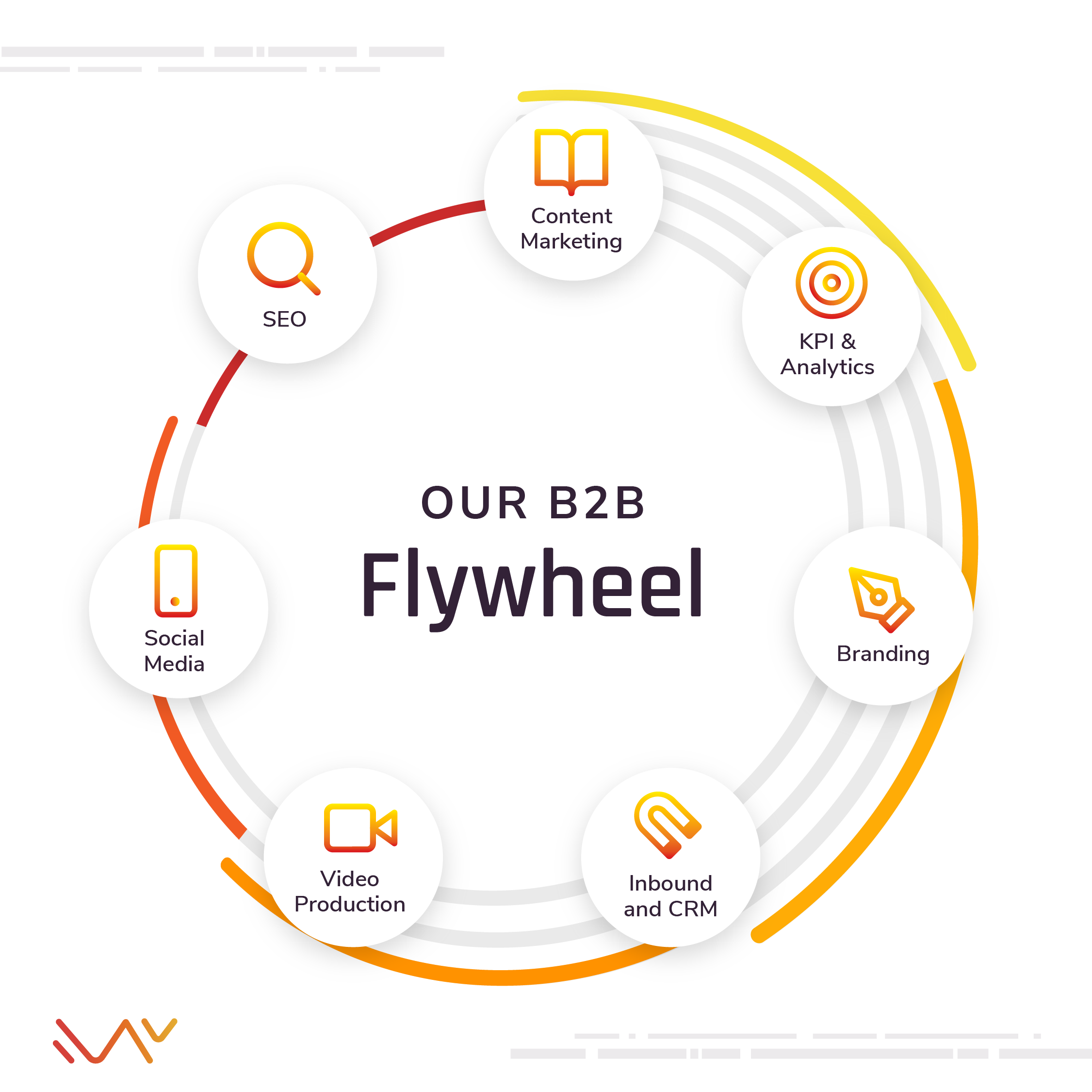//
Oct 21, 2022
5 Reasons your B2B Company Needs an Inbound Marketing Strategy
Are you finding that cold calling and bulk mailers aren't cutting through the noise of your competitors anymore? Creating an inbound marketing strategy can help you quiet competitors and let your audience hear you on their terms.
In this article, you'll find five reasons (actually, there are more than five, but we'll save you some time) why your business will benefit from having an inbound marketing strategy.
What Is Inbound Marketing?
Inbound marketing is a way to attract customers by creating and publishing content that is of value to them. It's not just about building websites but rather about creating a strategy to attract customers and prospects who will arrive at your website through search engines (i.e., "inbound" traffic).
With Inbound marketing, your company will attract, convert, deliver, and increase marketing momentum:
- Attract visitors with content.
- Convert visitors into leads via forms or email capture pages.
- Deliver customer service and support in real time.
- Increase marketing momentum. Inbound marketing is a powerful tool for increasing the momentum in your marketing flywheel.
What's a Marketing Flywheel?

It's a metaphor for how you can increase your brand's momentum by using inbound marketing to drive traffic and leads through your website, then converting those leads into paying customers. The effect is like the momentum created when a spinning wheel picks up speed and keeps going.
Inbound marketing is essential because it helps you use the power of content to build trust and authority with potential customers.
Inbound marketing uses content—like blogs, social media posts, videos, e-books, and webinars—to attract prospects who want to learn more about your business or buy your products or services.
Once they're interested in what you have to offer, they'll follow up with questions or requests for more information that eventually lead them right back to where they started: your website!
But that's not all inbound marketing can do for your company.
Boost visibility, create engagement, increase leads and make more money with Inbound Marketing
Follow our free, easy-to-follow video series designed to show how to attract and convert more leads— and make more money with these tactics.
Five Benefits of an Inbound Marketing Strategy and Why Your Company Needs One
1. Inbound marketing helps you reach more people:
Inbound marketing focuses on attracting customers to your business instead of pushing a product or service onto them. It's inherently more inclusive and diverse because it doesn't treat anyone as an outsider; you can tailor your message to a wide range of people in different stages of the buyer's journey.
2. Inbound marketing helps you build loyalty with current customers:
Loyal customers are the best customers.

Inbound marketing helps you build loyalty with current customers by providing the tools and techniques to attract, convert, and retain them.
It's a strategy beneficial for any business—B2C or B2B— and it's especially effective if you're a small or mid-sized company that doesn't have the resources for traditional advertising campaigns.
With inbound marketing, you're focusing on driving traffic to your website through organic search results and social media. Your content should be relevant to your audience and address their needs and interests. This way, when people come to your site, they'll find what they're looking for—and then they'll stick around!
3. Inbound marketing can work in conjunction (and improve) with other marketing efforts:
Inbound marketing is a strategy that focuses on attracting customers to your brand by providing them with the information they need before they even ask for it.
Inbound marketing can work in conjunction with other forms of online marketing, including:
- Pay-per-click advertising (PPC)
- Social media marketing
- Email marketing
- Content creation
4. Inbound marketing increases your conversion rate:
Inbound marketing also increases your conversion rate by making it easier for people to find what they're looking for.
Instead of wading through a sea of ads and unwanted information, your customers can see content relevant to them and their interests.
You'll also be able to track their activity on your site, so you can send them targeted emails and offers based on their previous behavior.
5. Inbound marketing is the most cost-effective form of marketing:
It's no secret that inbound marketing is the most cost-effective form of marketing.

In fact, according to a study by HubSpot, inbound marketing generates an average of $6.50 for every dollar spent on it. That's nearly seven times the return on investment of outbound marketing like print ads and TV commercials!
The reason is simple: inbound marketing focuses on building trust and relationships with your audience over time rather than bombarding them with ads they'll forget about as soon as they see them.
When you're able to build those relationships, you can sell them more products or services at a higher price point because your brand will stick with them longer than any ad ever could.
Common Misconceptions About Inbound Marketing
Outbound is still better
Outbound marketing is still around, as it has been for a decade, which leads the misconception that it dominates all other marketing strategies. However, HubSpot recently found that 70% of marketers surveyed actively invest in inbound marketing.
Inbound Marketing is the same as SEO
SEO revolves around attracting inbound leads to your website from optimizing the search results based on keywords. It doesn't involve generating qualified leads, however, that turn into sales - that entire process is inbound marketing.
Industry isn't fit for Inbound Marketing
Each year, every industry advances in some way digitally. Not every digital marketing platform like google or twitter is perfect for every business, but a sound strategy focused on converting sales has always will always be needed, despite the industry.
How To Leverage Your Website For Growth With An Inbound Strategy
Create a blog:
Blogging is one of the most effective ways to generate traffic and build your reputation as an expert in your field. Blogs are a great way to share information with people interested in what your business offers, so they can learn about it and contact you for more information or references.
Create a newsletter:
An email list of subscribers collected from your CRM can help you stay in touch with customers and prospects.
Just like with blogging, this gives them yet another opportunity for interaction with your brand—and it doesn't have to be anything fancy either: A simple list of updates might suffice, depending on the kind of business that you're running!
Create e-books/white papers/reports:
These types of resources give people access to valuable information and insight into how knowledgeable you are in your industry, building trust and reputation.
Create video content:
Video content is an excellent way to leverage your inbound marketing strategy because it's easy for customers to share and engage.
You can use videos on your website, blogs, and social media channels—anywhere you're trying to reach customers. And the best part?
Video content works across all devices, so no matter where people are looking at your content, they'll be able to access it easily!
Conclusion
This takeaway is simple: inbound marketing is a powerful strategy for growing your business, and it's not going away.
To stay competitive and relevant, you need to understand how this type of marketing works - especially since the truth about inbound isn't always what people think!
Dive into inbound marketing with Watermark

Denver digital marketing agency, Watermark, can conduct a deep dive into your B2B inbound marketing needs.
Contact us today to set up a discovery workshop and find out how an inbound marketing strategy can help you reach your sales and marketing goals.







